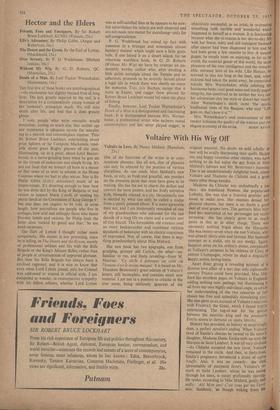Hector and the Elders
Friends, Foes and Foreigners. By Sir Robert Robertson, 16s.) Tun: first five of these books are autobiographical —the marketable but slightly bruised fruit of long lives. The last, greatly superior to the rest, is a description by a comparatively young woman of her husband's premature death. We will take death after life, and find that it does greatly please.
I wish people who write memoirs would remember, among so much else, that neither age nor experience is adequate excuse for moralis- ing in a peevish and commonplace manner. Thus Sir Robert Bruce Lockhart, entertaining about prize fighters or Sir Compton Mackenzie, read- able about great Rugby players of the past, illuminating, up to a point, about Lord Beaver- brook, is a nerve-grinding bore when he gets on to the virtues of endeavour and simple living. It's not our fault that we weren't all born in a manse or that some of us went to schools in the Home -Counties where we had to play soccer. Nor is Sir Philip Gibbs (Life's Adventure) much of an improvement. It's diverting enough to hear how he was done dirt by the King of Bulgaria or had reason to suspect Marie Corelli of stealing his picnic lunch at the Coronation of King George V; but one does not require to be told, at some length, how marvellous are people who live in cottages, how arid and unhappy those who haunt five-star hotels and casinos. Sir Philip finds the latter class `racked by greed and fear.' So are book reviewers.
The Earl of Lytton I thought rather more sympathetic. His matter is less promising, since he is telling, in The Desert and the Green, mainly of professional soldiers and life with the Rifle Brigade or the King's African Rifles, rather than of people or circumstances of approved glamour. But then the Rifle Brigade has 'always been a civilised regiment, and it is nice to know that even when Lord Lytton joined, only his Colonel was addressed or treated in official style. I am compelled to wonder, in restrospective sympathy with his fellow officers, whether Lord Lytton
was as self-satisfied then as he appears to be now; but nevertheless his safaris are well observed and are not made into matter for moralising—only for self-congratulation.
P. G. Wodchouse has mixed up fact with nonsense in a brusque and sometimes almost lapidary manner which might earn a little grati- tude, if one found it on a desert island, for an otherwise worthless book. In G. D. Roberts (Without My Wig) we have by contrast an un- deniably worthy author who, after exuding a little polite nostalgia about the Temple and its adherents, proceeds to be severely factual about a legal life in which there was clearly no room for nonsense. Tres, tres Buchan, except that it starts in Exeter, and rugger (how pleased Sir Robert Bruce Lockhart would be) takes the place of fishing.
Finally, however, Lael Tucker Wertenbaker's Death of a Man is a distinguished and fascinating book. It is distinguished because Mrs. Werten- baker, a professional writer who eschews moral commonplace and has never played rugger, is objectively successful, as an artist, in re-creal something both terrible and wonderful wf happened to herself as a woman. It is fascinat because what she re-creates is her day-to-day with her brave, witty and self-indulgent hush after cancer had been diagnosed in him and had been given a few months to live. A natt pagan, he simply went on enjoying, as far as could, the material goods of this world, the so pleasures of his own intelligence and the remit able, unmessy love of his wife. Like Horace, scorned to stay too long at the feast, and, N,,V sickness had taken the point away, he commit suicide. Mrs. Wertenbaker, while relishing handsome body, cool good sense and sturdy pa; integrity, has contrived to let neither her love her admiration cloy her style or distort her visi After Wertenbaker's death came 'the qui traditional visits of the Basques, who said "I goes on, that's how it is." '
Mrs. Wertenbaker's cool endorsement of verdict indicates the quality of the woman and


































 Previous page
Previous page